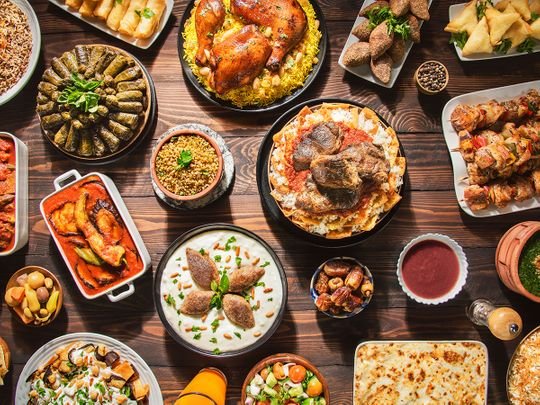Introduction: Exploring Vegetarian Emirati Cuisine
Emirati cuisine is famous for its meat-based dishes like shawarma, machboos, and shish taouk. However, vegetarianism is gaining popularity, and many restaurants now offer vegetarian dishes that cater to this lifestyle. Emirati cuisine is no different, and there are many vegetarian dishes that one can try when visiting the UAE. Here are some Emirati dishes that vegetarians can enjoy.
Balaleet: The Sweet and Savory Emirati Breakfast Dish
Balaleet is a breakfast dish that is a combination of sweet and savory flavors. It is made with vermicelli noodles that are cooked in a mixture of saffron, rose water, and sugar. The noodles are then topped with a spiced omelet made with onions, tomatoes, and green chili. Balaleet is a popular breakfast dish in the UAE and is often served with a side of yogurt or labneh.
Machboos: The Spicy Vegetarian Version of Emirati Biryani
Machboos is a rice-based dish that is popular in the UAE. It is typically made with meat, but there is also a vegetarian version that uses vegetables like potatoes, carrots, and peas. The rice is flavored with spices like cumin, coriander, and turmeric, and is often served with a salad or raita. Machboos is a spicy and flavorful dish that is perfect for lunch or dinner.
Harees: Smooth and Creamy Emirati Porridge for Vegetarians
Harees is a creamy porridge that is made with cracked wheat and milk. It is a popular dish during Ramadan and is often served as a side dish. Harees is easy to make and is flavored with spices like cinnamon, cardamom, and saffron. It is a smooth and creamy dish that is perfect for vegetarians who are looking for a comforting and filling meal.
Saloona: A Tomato-Based Vegetarian Stew Ideal for Emirati Lunch
Saloona is a tomato-based stew that is made with vegetables like okra, eggplant, and potatoes. It is a popular lunch dish in the UAE and is often served with rice or bread. Saloona is a flavorful and hearty stew that is perfect for vegetarians who are looking for a healthy and filling meal.
Luqaimat: Traditional Emirati Dessert for Vegetarian Sweet Tooth
Luqaimat is a traditional Emirati dessert that is perfect for vegetarians with a sweet tooth. It is made with dough that is fried and then drizzled with syrup and sesame seeds. Luqaimat is a popular dessert during Ramadan and is often served with Arabic coffee. It is a sweet and indulgent dessert that is sure to satisfy any sweet tooth.
In conclusion, Emirati cuisine has a range of vegetarian dishes that are flavorful and easy to make. These dishes offer a glimpse into the UAE’s culinary heritage and are a perfect way to experience the local culture. From sweet and savory breakfasts to hearty stews, Emirati vegetarian dishes are a delicious and satisfying option for any meal.

